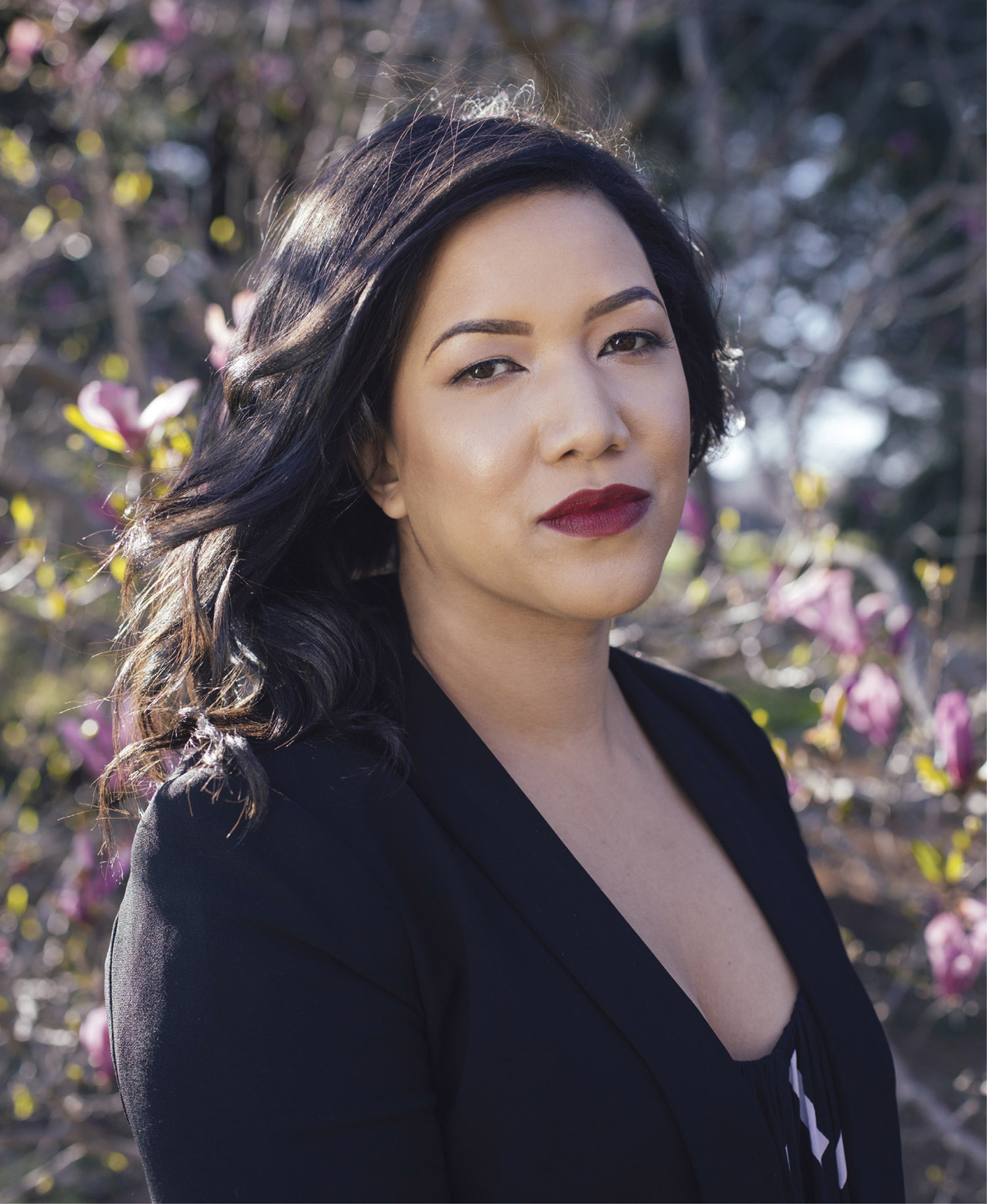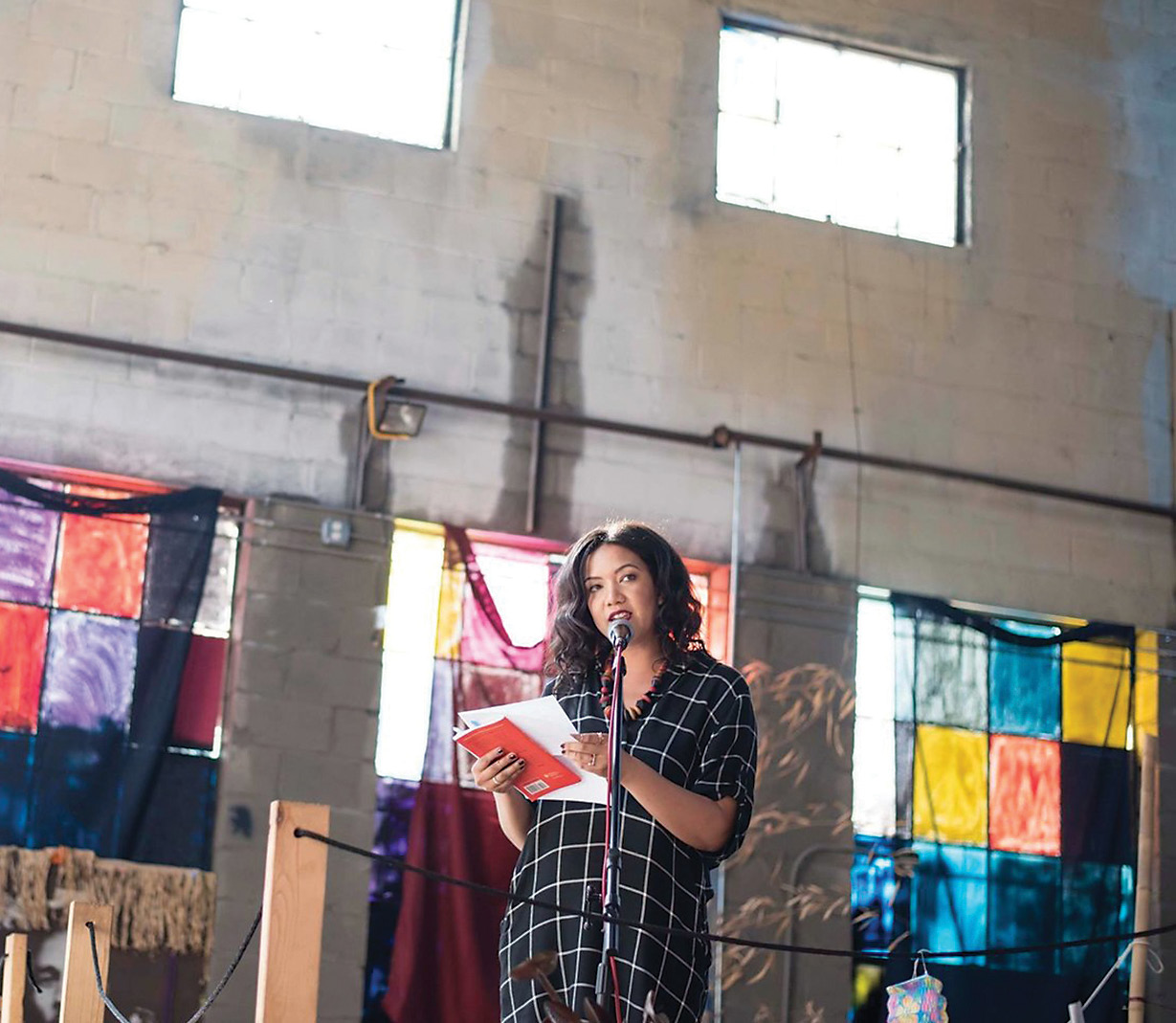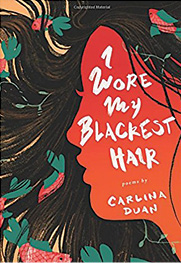By Nate Rau

Before Tiana Clark emerged as an electrifying new voice in poetry, before a flock of literary agents started calling, before she won a string of coveted writing awards, and before The New Yorker magazine published her poem “Nashville” to acclaim last fall, she’d been stung so badly by rejection that she’d stopped writing for an entire year.
The source of her disappointment: Vanderbilt’s highly ranked graduate creative writing program, one of the most selective in the country, had turned down her first application.
But Clark, who earned her Vanderbilt M.F.A. in 2017, turned her initial setback into motivation. She embarked on what she describes as her own graduate writing program—a sort of do-it-yourself curriculum. For starters, she plugged in to Nashville’s literary community, attending a women’s writing group that met at the Global Education Center, a local nonprofit promoting diversity in the arts. Clark also became a regular at open-mic poetry nights at coffee shops around town and created a network of fellow poets that would expand whenever she encountered another writer whose work she admired. All the while Clark, who was working a full-time job, honed her craft. Judging by the increasingly enthusiastic reception of listeners at the open-mic nights, and comments from her ever-growing circle of peers, she knew that her poetry was improving.
Finally, in 2014, Clark decided to apply again to Vanderbilt’s two-year M.F.A. program, which admits—and pays full tuition for—three poets and three fiction writers each year. When the call came from Professor of English Kate Daniels, director of Vanderbilt’s creative writing program, the women shared a special moment. Daniels delivered the good news, telling Clark that her poetry had bowled over the admissions team and that she’d earned a place in the M.F.A. program. Clark was so overwhelmed she began to weep. Then Daniels began to cry, too. It was the start of an enduring student–teacher relationship that would turn out to be a bedrock for Clark’s skyrocketing career.
“I had experienced so much rejection and failure at that point,” Clark says, noting that Vanderbilt was the only M.F.A. program she applied to that year. “It felt really powerful to have someone say, ‘We see your work and we want to invest in it. And we want to help you.’”
In her early 30s by the time she joined the M.F.A. program, Clark was several years older than most of her peers. She had a full-time job at a Nashville music-business office, while dedicating the rest of her time to writing. That strong work ethic, coupled with a rich background of life experiences, is what fueled her poetry. The result, her professors say, made for an extraordinary M.F.A. student.
“A lot of our very talented graduate-school students often are right out of college where they’ve done very well in their writing and they’re committed to writing,” says Mark Jarman, Centennial Professor of English at Vanderbilt. “But they haven’t had a whole lot of real-world experience, and Tiana clearly has.”
What struck Jarman most about Clark “was watching the alchemy of her reading turning into her own writing. That’s an unusual thing to see.”
He remembers an example of Clark taking what she learned in a class on traditional Romantic poetry and transforming it into a compelling work of her own about jazz musician Nina Simone.
Clark admits that what she didn’t have when she joined the program was a solid grounding in the nuts and bolts of poetry. Both inside and outside the classroom, she says, the M.F.A. program impacted her “in every way, down to the cellular level.
“You know how some musicians can play by ear, except they don’t know how to read sheet music?” Clark says. “For me, going to Vanderbilt, I knew how to write poetry by ear, but Vanderbilt taught me how to read the sheet music.
“I think in poetry … it’s valuable to learn the rules even as you actively break them. I have always chased poems from a free-verse impulse that I developed in high school, but I didn’t know how to articulate my intuition on or off the page.
“Like learning a new language, Vanderbilt taught me how to truly discourse about poetic craft by tracing my literary ancestry and aesthetic preferences. This lexicon helped to clarify my poetic drive to make and break received forms, forcing me to face my insecurities, quiet my ego, and consistently write outside my comfort zone.”

‘A MASTERPIECE’
Before arriving at Vanderbilt, Clark graduated from Tennessee State University, where she studied Africana and women’s studies. She grew up in California, the daughter of a single mom who moved the family to Nashville for a job at the Christian music label Sparrow Records.
Clark, whose mother is black and father is white, attended Nashville’s Hume-Fogg High School, where English teacher Bill Brown, MA’75, who later taught as a lecturer at Peabody, helped spark her love of poetry.
Graduating from TSU amid the 2007–08 recession, Clark worked as a server at J. Alexander’s restaurant near campus on West End Avenue. There she met a frequent diner and Music Row executive who eventually hired her as a secretary. When Vanderbilt rejected her M.F.A. application in 2012, Clark was admitted to another creative-writing program but elected not to attend because her husband had landed a good job in Nashville and they didn’t want to begin their new marriage apart from each other.
Before enrolling at Vanderbilt, Clark didn’t realize anyone could make a living as a poet. But her immediate success put her on the radar of the literary world and showed her that she really could turn poetry into a profession.
Within weeks of beginning the M.F.A. program, Clark won a $10,000 prize for her poem “Equilibrium” from the Los Angeles–based literary magazine Rattle, which has published work by poets such as Philip Levine and Sharon Olds. Since then she’s had three poems published in The American Poetry Review. And last October, The New Yorker published her poem “Nashville.”
So far in 2018, she has completed a year as a poetry fellow at the University of Wisconsin–Madison. She also won the prestigious Agnes Lynch Starrett Poetry Prize, the same award Kate Daniels received in 1983. Clark’s debut book of poetry, I Can’t Talk about the Trees without the Blood, will be released Sept. 18 by the University of Pittsburgh Press.
“For me, it’s inspiring when I have the opportunity to tell students that you can have a vocation as a creative writer,” Clark says. “I tell them every career path is full of difficulties and obstacles, so why not chase the thing you love? It’s a delight to show them a real-life example—especially as a woman of color—that if you’re serious about writing, and you want to steadfastly pursue it with a strong work ethic and you’re good at it, then there’s a place for you in this world.”
Perhaps no other poem exemplifies Clark’s writing style like “Nashville” (see sidebar below). At once visceral and deeply researched, the poem confronts issues that have become pervasive as a result of Nashville’s sudden popularity: racism, gentrification, appropriation of African American food, music and culture. The poem lands a particularly sensitive blow during a scene where someone shouts a racial epithet at the poem’s speaker and her husband as they walk through Nashville’s touristy honky-tonk district.
Vanderbilt Distinguished University Professor Houston Baker, another of Clark’s mentors, calls “Nashville” a “masterpiece,” saying she has the potential to achieve the highest of accolades in creative writing.
“I foresee Tiana at the Library of Congress in the future and … as a spokesperson and laureate for institutions from local community assemblies of writers to national and international memberships and assemblies of the most vaunted organizations devoted to excellence in creative writing, specifically poetry,” Baker says. “Her unflinching conviction that poetry must address hard facts, arrest perfidy and injustice, and spread revelatory and healing light across the world is the generative source of her excellence and its importance to the world.”
In the fall, Clark will begin a tenure-track assistant professorship at Southern Illinois University, Edwardsville, a position for which the school sought her out while she was still in the M.F.A. program. That’s a rarity, says Daniels. Yet, at the same time, Clark’s success is helping re-establish and continue Vanderbilt’s proud literary tradition—one of the primary goals for the M.F.A. program when it started in 2005.
“I would hope students, and a young poet like Tiana, would not be once in a lifetime. But it’s a huge gratification in the later years of my teaching career here to have run into her,” Daniels says. “I just adore her. She’s willing to be vulnerable. She’ll just grind. If it has to be done, she’ll just step up and grind through it, and not everybody can do that.”
Nashville
By Tiana Clark
is hot chicken on sopping white bread with green pickle
chips—sour to balance prismatic, flame-colored spice
for white people. Or, rather, white people now curate hot
chicken for $16 and two farm-to-table sides, or maybe
they’ve hungered fried heat and grease from black food
and milk—but didn’t want to drive to Jefferson Street or
don’t know about the history of Jefferson Street or Hell’s
Half Acre, north of downtown. Where freed slaves lived
on the fringe of Union camps, built their own new country.
Where its golden age brought the Silver Streak, a ballroom
bringing Basie, Ellington, and Fitzgerald. First-run movies
at the Ritz and no one had to climb to the balcony. 1968,
they built the interstate. I-40 bisected the black community
like a tourniquet of concrete. There were no highway exits.
120 businesses closed. Ambulance siren driving over
the house that called 911, diminishing howl in the distance,
black bodies going straight to the morgue. At the downtown
library, a continuous loop flashes sncc videos with black
and white kids training for spit and circular cigarette burns
as the video toggles from coaching to counters covered
in pillars of salt and pie and soda—magma of the movement.
On 1-65, there is a two-tone Confederate statue I flick off
daily on my morning commute. Walking down Second Avenue,
past neon honky-tonks playing bro-country and Cash
and herds of squealing pink bachelorette parties—someone
yelled Nigger-lover at my husband. Again. Walking down
Second Avenue, I thought I heard someone yelling at the back
of my husband. I turned around to find the voice and saw
myself as someone who didn’t give a damn. Again. I turned
around to find that it was I who lived inside the lovely word
made flesh by white mouths masticating mashed sweet potatoes
from my mother’s mother’s mother—Freelove was her name,
a slave from Warrior, North Carolina, with twelve children
with names like Pansy, Viola, Oscar, Stella, and Toy—my
grandmother. There is always a word I’m chasing inside and
outside of my body, a word inside another word, scanning
the O.E.D. for soot-covered roots: 1577, 1584, 1608 . . . Tracing my
finger along the boomerang shape of the Niger River for my blood.
1856, 1866, 1889 . . . Who said it? A hyphen—crackles and bites,
burns the body to a spray of white wisps, like when the hot comb,
with its metal teeth, cut close to petroleum jelly edging the scalp—
sizzling. Southern Babel, smoking the hive of epithets hung fat
above bustling crowds like black-and-white lynching photographs,
mute faces, red finger pointing up at my dead, some smiling,
some with hats and ties—all business, as one needlelike lady
is looking at the camera, as if looking through the camera, at me,
in the way I am looking at my lover now—halcyon and constant.
Once my mother-in-law said Watch your back, and I knew exactly
what she meant. Again. I turned around to find I am the breath
of Apollo panting at the back of Daphne’s wild hair, chasing words
like arrows inside the knotted meat between my shoulder blades—
four violent syllables stabbing my skin, enamored with pain.
I am kissing all the trees—searching the mob, mumbling to myself:
Who said it?
Who said it?
Who said it?
Originally published in the Oct. 9, 2017, issue of The New Yorker. Reprinted by permission of Tiana Clark.
Stars Collide
Graduates of Vanderbilt’s acclaimed M.F.A. in Creative Writing Program are making a mark on the literary world. Here are some recent accomplishments.
 Matthew Baker, MFA’12, published his debut story collection, Hybrid Creatures (LSU Press), in February. The collection is composed of four stories that are each narrated partly in an artificial language: HTML, music dynamics, math notations and formal logic. He also recently had three short stories optioned for film, including Life Sentence by Netflix.
Matthew Baker, MFA’12, published his debut story collection, Hybrid Creatures (LSU Press), in February. The collection is composed of four stories that are each narrated partly in an artificial language: HTML, music dynamics, math notations and formal logic. He also recently had three short stories optioned for film, including Life Sentence by Netflix.
Anders Carlson-Wee, MFA’15, won the 2017 Poetry International Prize.
Lee Conell, MFA’15, published her first collection of short stories, Subcortical (2017, Johns Hopkins Press), which recently was awarded the Story Prize Spotlight Award and an Independent Publisher Book Award. She will be a lecturer in creative writing at Vanderbilt in 2018–19.
Lisa Dordal, MDiv’05, MFA’11, a lecturer in English at Vanderbilt, published her first full-length collection of poetry, Mosaic of the Dark, in January 2018 (Black Lawrence Press).
Carlina Duan, current M.F.A. student, published a book of poetry, I Wore My Blackest Hair (2017, Little A Press).
Simon Han, MFA’16, published an essay in the December 17, 2017, issue of The Atlantic titled “The Impossible Task of Remembering the Nanking Massacre.”
Edgar Kunz, MFA’15, had his poem “Interim” published in the spring 2018 issue of literary journal Ploughshares. He is a 2017 National Endowment for the Arts fellow. His work has appeared in New England Review, Narrative, the Missouri Review and Best New Poets 2015 and 2017. He currently teaches at Salve Regina University in Newport, Rhode Island, and his first collection of poems, Tap Out, will be released in spring 2019.
Joshua Moore, current M.F.A. student, is the host and producer of NPR’s Versify podcast, broadcast nationally.
Melissa Cundieff Pexa, MFA’12, won the Autumn House Poetry Contest for Darling Nova, published in March by Autumn House.
Read about 2012 M.F.A. graduate Matthew Baker’s experience in the program.
